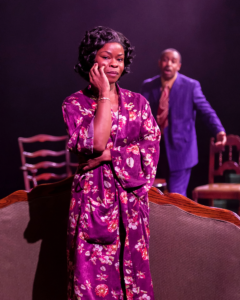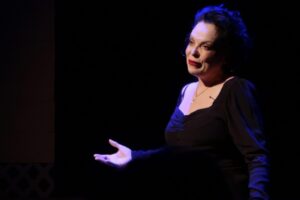DR. DU BOIS and MISS OVINGTON

Photos by Matthew Leland f Ben Guillory and Melanie Cruz in "Dr. Du Bois and Miss Ovington"
We are pioneers in a great experiment.
― Miss Ovington
…..The problem of the twentieth century is the problem of the color line
— The rest of the title
The NAACP (National Association for the Advancement of Colored People) is more than an African-American institution. It’s a legacy that has survived and continues to endure racism, sexism and all around ignorance. For those who know the history, civil rights activists William Edward Burghardt (W.E.B.) Du Bois along with, Mary “May” White Ovington and Moorfield Storey founded the organization. For this story, playwright Clare Coss focuses on the relationship between Du Bois (pronounced “doo-boys”) played perfectly by Ben Guillory and Ovington (the talented Melanie Cruz). It’s a beautiful Sunday morning and both Ovington and Du Bois are at work at the NAACP office they share. She starts typing letters and he plans to write his resignation. He just learned that another lynching took place the night before and feels let down. What more can he do? He’s frustrated, upset and feels deflated. Ovington is surprised but not shocked about the lynching. They come across as the Bonnie & Clyde of equality. She’s an open-minded optimist where he is more pragmatic. He admits to being hard to get along with and considers himself the black sheep of the organization.
Their intellectual banter resembles and intense tennis game, with each striking the ball with great respectful force. He is charming and she is sweet but firm. Miss Ovington barely reaches five feet, but she was a petite spitfire who will readily pounce if necessary. She kindly offers to write down his demands for the board to recognize him as an equal. She considers Du Bois lucky. Ovington needs permission to go to the library. If she were as erudite and eloquent as Dr. Du Bois she would have it a lot easier. Or, so she believes. “I’m a moving target,” he says after Ovington asks if he’s worried to walk down the street. Another case of the grass is always greener on the other side.
Coss does an excellent job in penning an introspective and thought-provoking autobiographical piece. She makes history interesting and this piece of unknown history is very fascinating. She doesn’t shy away from the ugly truth that black people were blatantly ostracized from everyday things. At the start of the play, Du Bois shows slides of black folks separated from white folks in public swimming pools, buying ice cream, even the children’s playground had a line dividing the black and white children. Coss shows the profound friendship between the two. It’s clear they have a deep admiration for one another. Coss’ words and Guillory’s direction makes this superb gem a joy to see. The characters are lively and poetic. You can feel how much their cause of equality is alive and well. It’s inspiration for these unsettling times with our current president. Dr. Du Bois and Miss Ovington gives us hope and we sure need it.
Dr. Du Bois and Miss Ovington is playing Thursday through Saturday at 8 p.m. and Sunday at 3 p.m. at the Los Angeles Theatre Center, located at 514 S. Spring Street, in Downtown Los Angeles until Sunday, May 21st. For ticket reservation, log on to www.thelatc.org or call (866) 811-4111.



